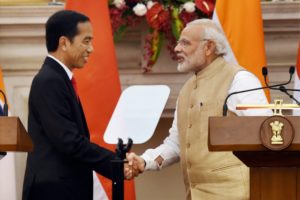India-Indonesia talks emphasise on fight against terror

Indian Prime Minister Narendra Modi and Indonesian President Joko Widodo at Hyderabad House in New Delhi. Credit: PTI
The meeting between Indian Prime Minister Narendra Modi and Indonesian President Joko Widodo gave importance to defence and security ties among other aspects in a bid to fight terrorism.
In a growing prioritisation of defence and security sector for India, Indian Prime Minister Narendra Modi met Indonesian President Joko Widodo in New Delhi, the capital of India, to discuss strategic ties addressing terrorism and organised crime at large. Widodo, the first Indonesian president visiting India in six years, is on a two-day visit to India since yesterday and met the Indian PM in a delegation meet, where three agreements were signed.
“Indonesia is one of our most valued partners in our Act East policy. We have shared economic and strategic interests. We have agreed to prioritise defence and security cooperation,” Modi stated, after inking the agreements at Hyderabad House in New Delhi. In the joint address with Wikodo, Modi added, “As the world’s most populous Muslim nation, Indonesia stands for democracy, diversity, pluralism and social harmony. These are also our values. Our nations and societies have nurtured strong bonds of commerce and culture throughout our history.”
Dynamic commercial partnership.#IndiaIndonesia are committed to enhancing economic engagement b/w both countries and tapping potential pic.twitter.com/eg2NIwPGtu
— Indian Diplomacy (@IndianDiplomacy) December 12, 2016
Talking about trade ties, Modi said that both sides agreed that early implementation of India-ASEAN Free Trade Agreement in Services and Investment, and finalisation of the Regional Comprehensive Economic Partnership would be important steps to further boost trade ties. Apart from that, agreements on cooperation in the area of youth and sports and standardisation were explored. The ongoing South China Sea dispute, a matter of international concern wherein Indonesia is a party, was also discussed. Peaceful means and accordance to the universally-recognised principles of international law, including the United Nations Convention on the Law of the Sea (UNCLOS), was called for, in a move that saw India taking a strong stance on the issue. Adding to talks on the international system, support for reforms to the UN and its principal organs, including the Security Council was expressed by both leaders.
Defence and Security
The two countries also issued a joint statement on Maritime Cooperation, outlining the agenda of engagement in maritime space including maritime security, maritime industry, maritime safety and navigation. “As strategic partners and maritime neighbours, the two leaders emphasised upon the importance of further consolidating the security and defence cooperation between the two countries,” the joint statement said.
On boosting defence ties, the two leaders hoped for speedy conclusion of the Defence Ministers’ Dialogue and the Joint Defence Cooperation Committee (JDCC) meetings to result in a bilateral defence cooperation agreement. “The defence ministers of the countries have been tasked with exploring collaboration between defence industries for joint production of equipment with technology transfer, technical assistance, and capacity-building,” the statement said.
Held extensive talks with President @jokowi on improving ties with Indonesia, one of the most valued partners in our Act East Policy. pic.twitter.com/dnP3nQHvXH
— Narendra Modi (@narendramodi) December 12, 2016
The moot issue of counter-terrorism
Looking to fight terror, the two countries agreed to enhance cooperation including through greater exchange of information and intelligence sharing. The joint statement, in a condemnation of terrorism in all forms, emphasised on “zero tolerance” of acts of terror. “All states must deal with transnational terrorism emanating from their territory through effective criminal justice response,” the joint statement asserted. Both parties called upon all countries to implement the United Nations Security Council Resolution 1267 (banning militant groups and their leaders) and other resolutions designating terrorist entities. This has been interpreted as a reference to China’s attempt in blocking India’s move to get Jaish-e-Mohammed chief Masood Azhar designated as a global terrorist.
Terrorism remains both a domestic and an international issue of concern for both countries, with growing radicalisation of youth in Indonesia. As for India, even as different manifestations of terror slowly emerge, escalating tensions with Pakistan remains the most important issue in terms of terrorism. As an attempt to deal with a country which has repeatedly been termed a terror state in recent times, Modi has pushed for strategic cooperation and international support in addressing the issue of terror and Pakistan. Adding to India’s fight against cross-border terrorism, this meet saw both leaders urge all nations to work towards eliminating terrorist safe havens and machineries.









